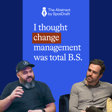
Big Risks and Big Rewards: René Paula, GC & SVP of Legal & Business Affairs, Vaxxinity
What does it take for a lawyer to expand their remit and become an operator, a business strategist, or even a founder? Beyond speaking up, what do you need to take on in order to advance from the traditional legal role of in-house counsel?
René Paula, Vaxxinity’s GC and Senior Vice President of Legal and Business Affairs, knows a lawyer needs to be able to speak multiple languages. Not just spoken languages, but the languages of math, finance, and accounting. It helped fuel his marathon career, including financial transactions at HSBC, counsel at Amazon’s Audible, new ventures at Anheuser Busch, closing a sale to Accenture, and taking Vaxxinity public.
Join René as he discusses the challenges and triumphs he’s faced and emphasizes the importance of maintaining an intimate connection to your financial numbers.
Read detailed summary: https://www.spotdraft.com/podcast/episode-17
Topics:
Introduction: 00:15
Recounting the experiences that shaped you as a leader: 2:14
Entering the world of financial services at HSBC: 4:18
Moving into tech at Amazon’s Audible: 6:13
Transitioning from in-house lawyer to founder at Sonar: 11:01
Spearheading Zx Ventures at Anheuser Busch: 16:39
Expanding beyond legal and chasing big enterprise at Bionic: 19:49
Selling your professional services business to Accenture: 22:43
Returning to legal and operations at Vaxxinity: 25:29
Positioning yourself as an operator from a General Counsel role: 32:24
Mistakes you’ve made and seen others make: 38:10
Book recommendations: 41:39
Connect with us:
René Paula: https://www.linkedin.com/in/rpaula/
Tyler Finn - https://www.linkedin.com/in/tylerhfinn
SpotDraft - https://www.linkedin.com/company/spotdraft
SpotDraft is a leading CLM platform that solves your end-to-end contract management issues. Visit https://www.spotdraft.com to learn more.



















